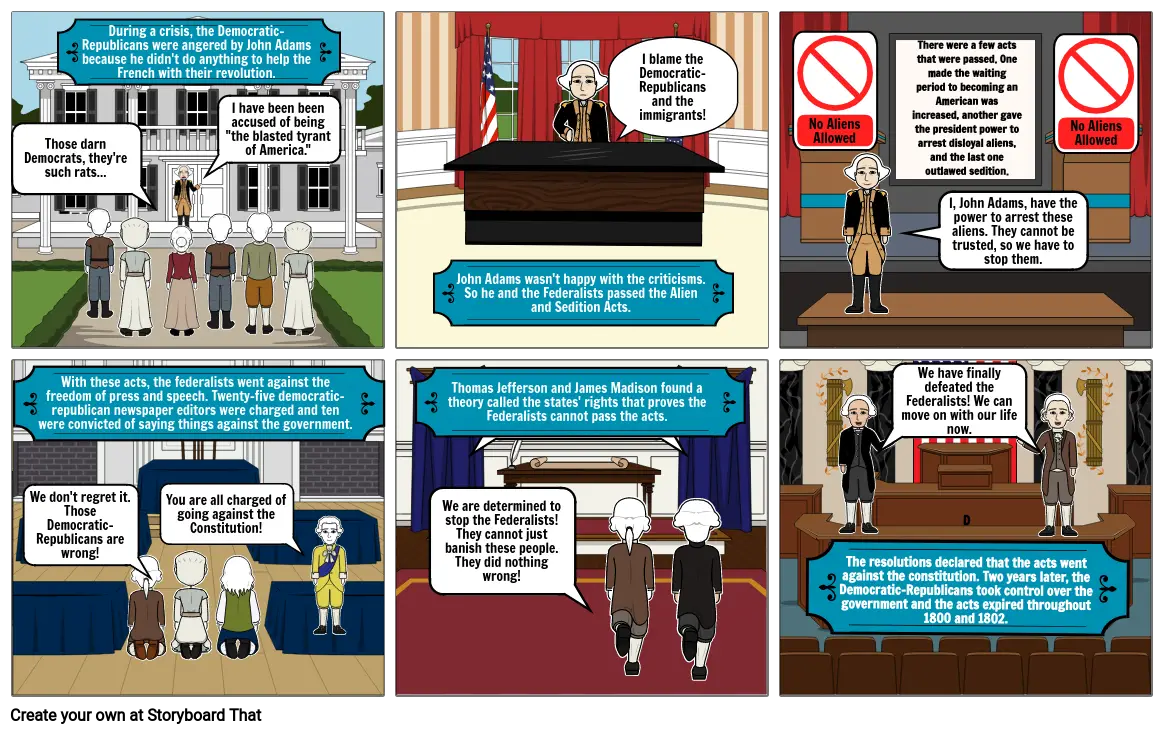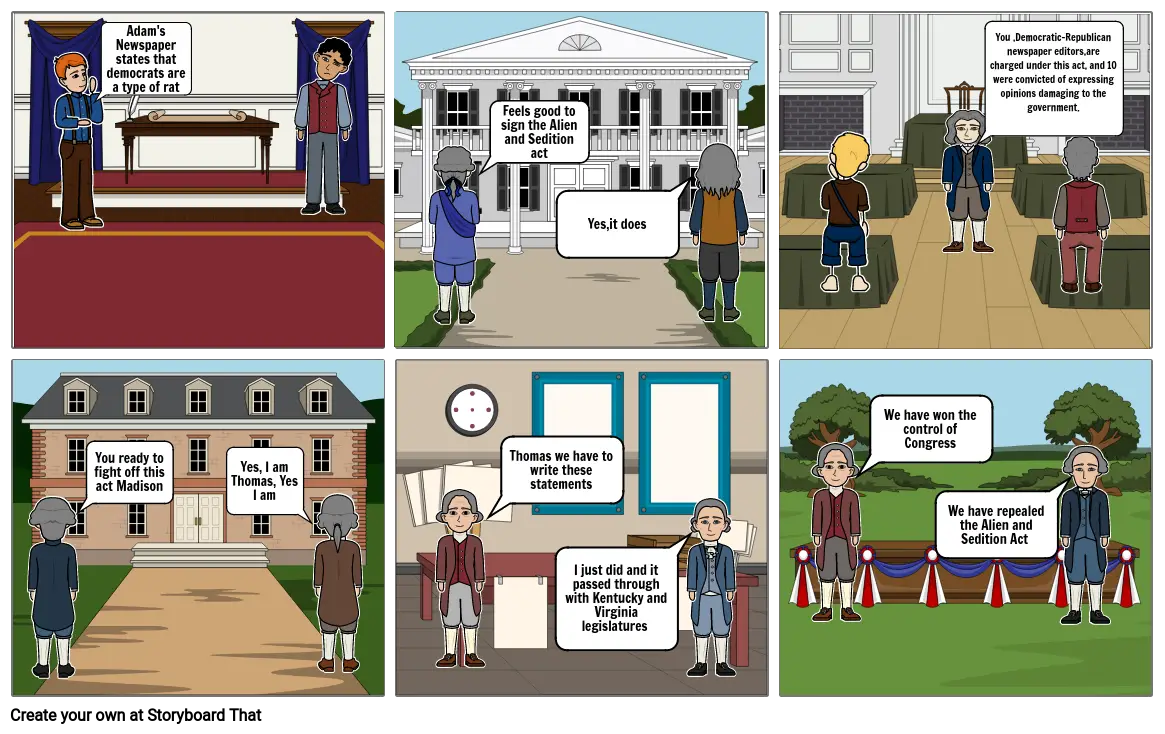How Did Republicans View The Alien And Sedition Acts Quizlet
How did the Republicans view the Alien and Sedition Acts? Republicans viewed the Sedition Act as an attack on the rights of free speech and free press. Why did most Federalists favor good relations with Great Britain? Some were merchants and shippers whose business depended on trade with Americas former enemy.
John Adams : The Second President Of The United States
John Adams was known for being the second president of the United States. He was a man of will power and strength that was an advocate of independence from Britain. Adams, along with other supporters of America wrote the Declaration of Independence. He was one of the most influential leaders that America has had. He did anything and everything to break away from Britain and become an independent country. Aside from being of the nations greatest leaders he was also a loving husband and a father
Did Democratic Republicans Support The Alien And Sedition Acts
The Alien and Sedition Acts were four laws passed by the Federalist-dominated 5th United States Congress and signed into law by President John Adams in 1798. At the time, the majority of immigrants supported Thomas Jefferson and the Democratic-Republicans, the political opponents of the Federalists.
Recommended Reading: Are There Any Other Republicans Running For President
Module 8: Growing Pains The New Republic
- Identify key examples of partisan wrangling between the Federalists and Democratic-Republicans
- Describe how foreign relations affected American politics
- Assess the importance of the Louisiana Purchase
George Washington, who had been reelected in 1792 by an overwhelming majority, refused to run for a third term, thus setting a precedent for future presidents. In the presidential election of 1796, the two partiesFederalist and Democratic-Republicancompeted for the first time. Partisan rancor over the French Revolution and the Whiskey Rebellion fueled the divide between them, and Federalist John Adams defeated his Democratic-Republican rival Thomas Jefferson by a narrow margin of only three electoral votes. In 1800, another close election swung the other way, and Jefferson began a long period of Democratic-Republican government.
For Discussion And Writing

Also Check: Why Did Radical Republicans Impeach Johnson
Federalists Thought Seditious Libel Law Was Part Of Common Law
Federalists genuinely worried that the French threat, both military and ideological, might be enough to topple the infant republic. To them, a seditious libel law was part of the English common law, constitutional under the necessary and proper clause, and an obvious instrument of defense. They believed the First Amendment embodied only the common law protection of forbidding prior restraint. Leading Federalists thought that it was impossible to attack members of the government without attacking the very foundation of;government itself.
The Federalists argued that the Sedition Act in reality expanded civil liberties. The act allowed the truth of the matter contained in publication as evidence in defense and gave the jury a right to determine the law and the fact. This contrasted with English common law, which did not admit truth as a defense and limited the role of the jury to establishing the fact of publication.
Why Did Democratic Republican Leaders Pressure Congress To Repeal The Alien And Sedition Acts
Why did Democratic-Republican leaders pressure Congress to repeal the Alien and Sedition Acts? They argued that the acts violated the Neutrality Proclamation. They believed that the acts hurt the interests of farmers in southern states.
Recommended Reading: Are There More Registered Democrats Or Republicans
The United States And The French Revolution 17891799
The French Revolution lasted from 1789 until 1799. The Revolution precipitated a series of European wars, forcing the United States to articulate a clear policy of neutrality in order to avoid being embroiled in these European conflicts. The French Revolution also influenced U.S. politics, as pro- and anti- Revolutionary factions sought to influence American domestic and foreign policy.
From 1790 to 1794, the French Revolution became increasingly radical. After French King Louis XVI was tried and executed on January 21, 1793, war between France and monarchal nations Great Britain and Spain was inevitable. These two powers joined Austria and other European nations in the war against Revolutionary France that had already started in 1791. The United States remained neutral, as both Federalists and Democratic-Republicans saw that war would lead to economic disaster and the possibility of invasion. This policy was made difficult by heavy-handed British and French actions. The British harassed neutral American merchant ships, while the French Government dispatched a controversial Minister to the United States, Edmond-Charles Genêt, whose violations of the American neutrality policy embroiled the two countries in theCitizen Genêt Affair until his recall in 1794.
Alien And Sedition Acts
The Alien and Sedition Acts were a series of four laws passed by the U.S. Congress in 1798 amid widespread fear that war with France was imminent. The four lawswhich remain controversial to this dayrestricted the activities of foreign residents in the country and limited freedom of speech and of the press.
Recommended Reading: How Many Senate Seats Did The Republicans Pick Up
What Was The Purpose Of The Alien And Sedition Acts
As a result, a Federalist-controlled Congress passed four laws, known collectively as the Alien and Sedition Acts. These laws raised the residency requirements for citizenship from 5 to 14 years, authorized the President to deport aliens and permitted their arrest, imprisonment, and deportation during wartime.
What Is The Legal Definition Of Insurrection
insurrection n : the act or an instance of revolting esp. violently against civil or political authority or against an established government. ;also. : the crime of inciting or engaging in such revolt [whoever incites, sets on foot, assists, or engages in any rebellion or against the authority of the United States
Also Check: Did Republicans Block Funding For Election Security
What Were The Alien And Sedition Acts
Amid mounting tensions, Federalists accused Republicans of being in league with France against their own countrys government. Writing in June 1798 in the Gazette of the United States, Alexander Hamilton called the Jeffersonians more Frenchmen than Americans and claimed that they were prepared to immolate the independence and welfare of their country at the shrine of France.
Fears of an imminent French invasion led the Adams administration to begin war preparations and pass a new land tax to pay for them.
With fears of enemy spies infiltrating American society, the Federalist majority in Congress passed four new laws in June and July 1798, collectively known as the Alien and Sedition Acts.
With the Naturalization Act, Congress increased residency requirements for U.S. citizenship to 14 years from five.
The Alien Enemies Act permitted the government to arrest and deport all male citizens of an enemy nation in the event of war, while the Alien Friends Act allowed the president to deport any non-citizen suspected of plotting against the government, even in peacetime.
How Does The Constitution Allow For Enduring Debate

America has what Hamilton designed because we have national banks and what Jefferson designed because he disapproved in the Alien and Sedition acts recently history the Patriot act and Obama Care have pushed The Constitution in to debate.The U.S. Constitution is always up for debate and alive though the debates because it has the amendment clause and the Supreme Court. It can also cause debate because it is so vague in the elastic clause. The elastic clause is the
Read Also: Why Do Democrats And Republicans Hate Each Other
Effects On Foreign Relations
Genêt continued to defy the wishes of the U.S. government, sending American recruits to capture British ships and rearm them as privateers. Washington sent Genêt an 8,000-word letter of complaint on Jefferson and Hamiltons recommendation. Genêt refused to cease his activities, challenging Washingtons executive authority and blatantly disregarding official American policy.
The Citizen Genêt Affair spurred Great Britain to instruct its naval commanders in the West Indies to seize all ships trading with the French. The British captured hundreds of American ships and their cargoes, increasing the possibility of war between the two countries. The Affair came to an end when the Jacobins, having taken power in France in January 1794, sent an arrest notice to Washington that demanded that Genêt return to France. Genêt, knowing that he would likely be sent to the guillotine, asked Washington for asylum. It was HamiltonGenêts fiercest opponent in the cabinetwho convinced Washington to grant him safe haven in the United States. With his mission and life of public service officially over, Genêt relocated to New York and lived the rest of his life as a private gentleman farmer.
Sketch of Citizen Genêt: Edmond-Charles Genêt came dangerously close to violating President Washingtons Proclamation of Neutrality.
For What Reason Were The Alien And Sedition Acts Unpopular With Most Americans
For what reason were the Alien and Sedition Acts unpopular with most Americans? They were at odds with the U.S. Constitution. Which War of 1812 battle was the most decisive in asserting American dominance over the British in the Old Northwest? What was the importance of the U.S. Supreme Court case Marbury v.
Don’t Miss: How Did Republicans Do In The Primaries
The Alien Enemies Act In The 20th And 21st Centuries
The Alien Enemies Acts remained in effect at the outset of World War I and remains U.S. law today. It was recodified to be part of the US war and national defense statutes .
On December 7, 1941, responding to the bombing of Pearl Harbor, President Franklin Delano Roosevelt used the authority of the revised Alien Enemies Act to issue presidential proclamations #2525 , #2526 , and #2527 , to apprehend, restrain, secure and remove Japanese, German, and Italian non-citizens. On February 19, 1942, citing authority of the wartime powers of the president and commander in chief, Roosevelt issued Executive Order 9066, authorizing the Secretary of War to prescribe military areas and giving him authority that superseded the authority of other executives under Proclamations 25257. EO 9066 led to the internment of Japanese Americans, whereby over 110,000;people of Japanese ancestry, 62% of whom were United States citizens, not aliens, living on the Pacific coast were forcibly relocated and forced to live in camps in the interior of the country.
Reaction To The Alien And Sedition Acts
Matthew Lyon, a Republican congressman from Vermont, became the first person tried under the new law in October 1798. A grand jury indicted Lyon for publishing letters in Republican newspapers during his reelection campaign that showed intent and design to defame the government and President Adams, among other charges. Lyon acted as his own attorney, and defended himself by claiming the Sedition Act was unconstitutional, and that he had not intended to damage the government.
He was convicted, and the judge sentenced him to four months in prison and a fine of $1,000. Lyon won reelection while sitting in jail, and would later defeat a Federalist attempt to kick him out of the House.
Another individual famously prosecuted under the Sedition Act was the Republican-friendly journalist James Callender. Sentenced to nine months in prison for his false, scandalous, and malicious writing, against the said President of the United States, Callender wrote articles from jail supporting Jeffersons campaign for president in 1800.
After Jefferson won, Callender demanded a government post in return for his service. When he failed to get one, he retaliated by revealing the first public allegations of Jeffersons long-rumored relationship with a slave woman, Sally Hemings, in a series of newspaper articles.
You May Like: Is Economy Better Under Democrats Or Republicans
Who Can Suppress An Insurrection
Whenever there is an insurrections in any State against its government, the President may, upon the request of its legislature or of its governor if the legislature cannot be convened, call into Federal service such of the militia of the other States, in the number requested by that State, and use such of the armed
How Did People Feel About The Alien And Sedition Act Passed In The 1700s
Who are the experts?Our certified Educators are real professors, teachers, and scholars who use their academic expertise to tackle your toughest questions. Educators go through a rigorous application process, and every answer they submit is reviewed by our in-house editorial team.
The Alien and Sedition Acts, passed by the administration of President John Adams, were hugely controversial. The government claimed that these measures were necessary to protect national security from both internal and external threats. Opponents, however, saw them as unnecessary and draconian . They saw them as…
Recommended Reading: How Many Republicans Voted In The Texas Primary
Acts Concerning Aliens And Alien Enemies
The Naturalization Act was followed by the Act Concerning Aliens, and the Act Concerning Alien Enemies.
These two bills gave the president sweeping powers to act against those who were still only immigrants, by permitting their arrest and deportation if they were suspected of treasonable or secret leanings.
The bills sponsor, Harrison Gray Otis, explained pretty candidly that his legislation was prompted by his desire that we not wish to invite hordes of wild Irishmen, nor the turbulent and disorderly of all parts of the world to come here with a view to disturb our tranquility, after having succeeded in the overthrow of their own governments. So let immigrants be put on notice by these bills, that if they immigrate to the United States, they can be sent back at a moments notice, by order of the president if there was a suspicion that they have been involved in treasonous or seditious activities. The definition of treasonous or seditious activities was left unexplained.
Learn more about;the place where European ideas of society no longer applied.
Is It Treason To Kill A Swan

All swans are the property of the Queen, and killing one is an act of treason. Not quite Since the 12th century, the Crown has held the right to ownership over all wild, unmarked mute swans in open water. Killing one of the Queens mute swans may be unlawful, but it has never been an act of treason.
Read Also: Who Is Right Republicans Or Democrats
The Xyz Affair And The Threat Of War
Their fight over the Alien and Sedition Acts was just one example of how Americas first two political parties were split over foreign policy. In 1794, Britain was at war with France. When Federalist President George Washington signed the Jay Treaty with Britain it greatly improved Anglo-American relations but enraged France, Americas Revolutionary War ally.;
Shortly after taking office in 1797, President John Adams tried to smooth things over with France by sending diplomats Elbridge Gerry, Charles Cotesworth Pinckney, and John Marshall to Paris to meet face-to-face with French foreign minister, Charles Talleyrand. Instead, Talleyrand sent three of his representativesreferred to as X, Y, and Z by President Adamswho demanded a $250,000 bribe and a $10 million loan as conditions of meeting with Talleyrand.
After the U.S. diplomats rejected Talleyrands demands, and the American people became angered by the so-called XYZ Affair, fears of an outright war with France spread.
While it never escalated beyond a series of naval confrontations, the resulting undeclared Quasi-War with France further strengthened the Federalists’ argument for passage of the Alien and Sedition Acts.;
What Was The Reaction To The Alien And Sedition Acts
These laws were designed to silence and weaken the Democratic-Republican Party. Negative reaction to the Alien and Sedition Acts helped contribute to the Democratic-Republican victory in the 1800 elections. Congress repealed the Naturalization Act in 1802, while the other acts were allowed to expire.
You May Like: Did Republicans Cut Funding For Benghazi
How Do You Use Sedition In A Sentence
Sedition in a Sentence ?
How Did The Democratic Republicans Viewed The Alien And Sedition Acts
The democratic republicans viewed the alien and sedition acts by the misuse of the government powers unconstitutional
Registered users can ask questions, leave comments, and earn points for submitting new answers.
Already have an account? Log in
Ask questions, submit answers, leave comments
Earn points for using the site
Already have an account? Log in
Read Also: How Many Registered Republicans In Texas
Alien And Sedition Acts Of 1798
Justin Florence
In the summer of 1798 the young United States was on the brink of war with France, one of the mightiest powers in the world. Some worried America faced not only a powerful enemy abroad, but also a threatening undercurrent of opposition at home. Hoping to strengthen the nation during war, and at the same time crush their political rivals, the Federalist party in power passed a series of four laws collectively termed the Alien and Sedition Acts. Alexander Hamilton, a leading Federalist, believed as a result of the new laws “there will shortly be national unanimity.”
Hamilton, like most other Americans in the eighteenth century, maintained that political factions or parties threatened the stability of the newnation. Yet hardly had the first Congress convened before proto-parties began to form. An array of congressmen known as Republicans joined Thomas Jefferson and James Madison in opposing Hamilton’s economic plans. Newly founded political newspapers helped congressmen and party leaders attract the support of ordinary voters. Newspaper editors in the 1790s actively aligned themselves with national figures and parties, while launching fierce attacks against political rivals.
See also: Naturalization Act; Espionage Act and Sedition Act .
